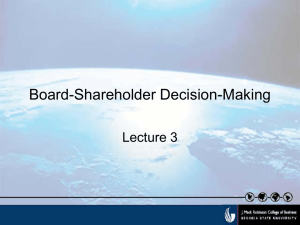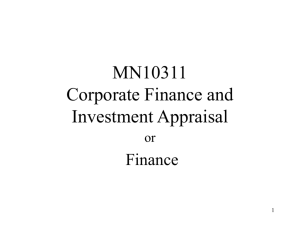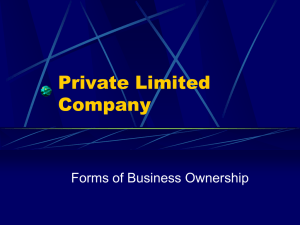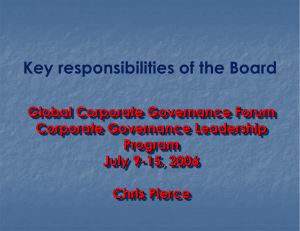Chapter 23
advertisement
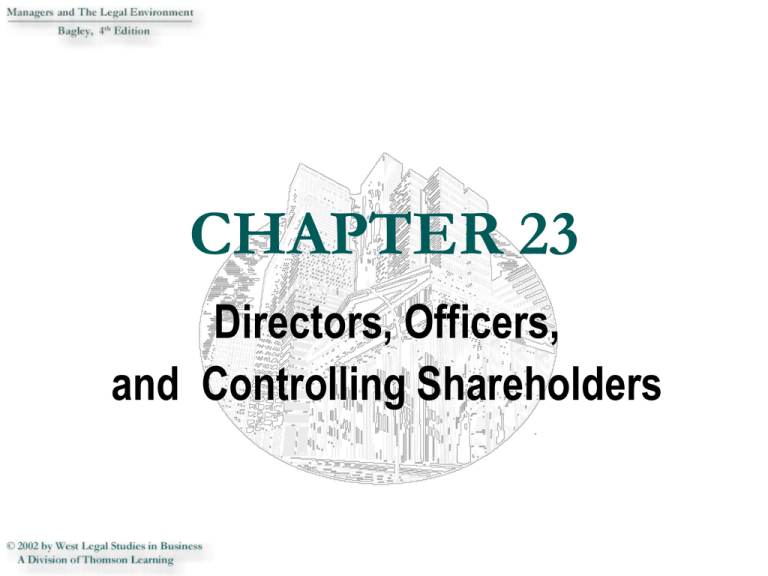
CHAPTER 23 Directors, Officers, and Controlling Shareholders INTRODUCTION This chapter examines the business judgment rule, and duties and liabilities of officers, directors, and controlling shareholders. 2 THE BUSINESS JUDGMENT RULE AND THE DUTY OF CARE Under the business judgment rule a court will normally let a decision by a corporate board acting in good faith stand and not replace it with the court’s own decision. 3 THE BUSINESS JUDGMENT RULE AND THE DUTY OF CARE Case 23.1 Synopsis. Smith v. Van Gorkom (1985). Van Gorkom, chairman of the board of Trans Union, a publicly traded company, asked the CFO to work out a price per share for Trans Union stock. The CFO did not try to fix the intrinsic value of the company, but came up with a cash-flow and debt-financing price. Van Gorkom used that price to negotiate a merger plan with Pritzker. A board meeting was called with one day’s notice. The board approved the plan after a two-hour meeting. The plaintiff sued challenging the stock price as too low. CONTINUED 4 THE BUSINESS JUDGMENT RULE AND THE DUTY OF CARE Case 23.1 Synopsis. (Cont’d) ISSUE: Were directors who accepted and submitted to the shareholders a proposed cash merger without determining the intrinsic value of the company grossly negligent in failing to inform themselves adequately before making their decision? HELD: The Delaware Supreme Court found the Trans Union directors grossly negligent in making such an uninformed decision. The case was settled for $25.5 million—$13.5 million in excess of the director’s liability insurance. 5 THE BUSINESS JUDGMENT RULE AND THE DUTY OF CARE Informed Decision – required for the business judgment rule. – Reliability of Officers’ Reports - cannot be taken on blind faith. – Reliability of Experts’ Reports - the board should hire reputable advisors and engage in reasonable oversight of them; conclusions drawn by experts should have a stated, factual basis for them. – Investment Banker’s Fee Structure - compensation should not impair the investment banker’s independence. THE BUSINESS JUDGMENT RULE AND THE DUTY OF CARE Reasonable Supervision—as fiduciaries, directors must exercise this duty over corporate operations. Case 23.2 Synopsis. In Re Caremark Derivative Litigation (Del. Ch. 1996). Caremark was charged with many felonies and entered agreements to pay nearly $250 million. A shareholder derivative suit was filed seeking to make the directors personally liable for this amount. The proposed settlement included no personal payments by directors, only a series of procedures the company would implement. ISSUE: What is the scope of a director’s duty to exercise reasonable supervision over corporate operations? HELD: The court found this acceptable and said the shareholders could elect new directors if they did not like this result. 7 THE BUSINESS JUDGMENT RULE AND THE DUTY OF CARE View From Cyberspace: Shareholder Meetings in Cyberspace. Disinterested Decision - the business judgment rule does not apply if the directors have a conflict of interest. Disclosure Violations by Directors. 8 STATUTORY LIMITATIONS ON DIRECTORS’ LIABILITY FOR BREACH OF DUTY OF CARE Delaware’s Statute - §102(b)(7) permits the certificate of incorporation to limit or eliminate directors’ personal liability for monetary damages for breach of fiduciary duty; but not for a breach of loyalty, bad faith, or violation of securities laws. California’s Statute - more restrictive than Delaware; e.g., liability for an unexcused pattern of inattention that amounts to an abdication of corporate duties. 9 DUTY OF LOYALTY Corporate Opportunities - directors may not take personal advantage of corporate opportunities. If so, there may be a constructive trust. Court apply several tests, including the “line of business” test. 10 EXECUTIVE COMPENSATION One of the most controversial issues in corporate governance today is the high level of executive compensation. Stock options – usually exercisable at the market price at the time of grant for up to ten years. Golden Parachutes – lucrative severance payments or stock awards made in the event the CEO loses control of the company due to a takeover or other change of control. 11 DUTIES IN THE CONTEXT OF TAKEOVERS, MERGERS, AND ACQUISITIONS Courts want directors to consider seven factors before deciding to sell the company: The Company’s Intrinsic Value - as a going concern and on a liquidation basis. Delegation of Negotiating Authority - board members who will financially benefit should not negotiate the deal; may impose greater risk of liability. Non-Price Considerations - all material factors should be considered. 12 DUTIES IN THE CONTEXT OF TAKEOVERS, MERGERS, AND ACQUISITIONS 4. No-Talk Provisions 5. Break-Up Fees 6. Takeover Defenses - the business judgment rule favors directors, but care is needed. Poison Pills (shareholder rights plan) and Golden Parachutes in the event of takeover (Pantry Pride hostile takeover of Revlon). 7. When Is a Company in Revlon Mode? - What constitutes an event that triggers the Revlon duty for directors to maximize share price? 13 DUTIES IN THE CONTEXT OF TAKEOVERS, MERGERS, AND ACQUISITIONS Case 23.3 Synopsis. Paramount v. QVC Network Inc (Del. 1994). Paramount had entered friendly negotiations with Viacom to purchase Viacom. They both said other bidders were not welcome or wanted; this was part of a strategic plan. QVC made a bid for Viacom. This started a bidding war. Viacom stopped listening to QVC bids and accepted Paramount’s bid. ISSUE: Does a board of directors have an obligation to consider an unsolicited tender offer (the Revlon duty) from one corporation when the board has expressed a desire not to receive competing bids because it is engaging in a friendly merger agreement with another corporation? HELD: YES. The Supreme Court of Delaware ruled that it did not matter that this merger started off as part of a strategic plan. Once competitive bids were received, the board had a duty to listen to them all to maximize the shareholders’ wealth because there would be a change in control of the corporation (the Revlon duty). 14 ALLOCATION OF POWERS BETWEEN THE DIRECTORS AND THE SHAREHOLDERS Potential conflict between the two groups over selling the corporation in hostile takeovers and in using defensive tactics; directors control corporate assets, but may not always represent the shareholders interests. 15 ALLOCATION OF POWERS BETWEEN THE DIRECTORS AND THE SHAREHOLDERS Poison Pills (Shareholder Rights plan) – a plan that would make any takeover not approved by the directors prohibitively expensive. “Dead Hand” Pills – which could be redeemed only by the directors in office before the hostile bidder gained control, or their designated successors. Control and Blasius Standard – action is strongly suspect and cannot be sustained without a compelling justification. ALLOCATION OF POWERS BETWEEN THE DIRECTORS AND THE SHAREHOLDERS Case 23.4 Synopsis. Quickturn Design v. Shapiro, (Del. 1998). Mentor launched a hostile bid for Quickturn with a tender of $12.125 a share, a 50 percent premium over Quickturn’s pre-offer price. Mentor also announced its intent to replace the Quickturn board at a special meeting. Quickturn board concluded that Mentor’s offer was inadequate and recommended that Quickturn shareholders reject it. The board also amended Quickturn’s shareholder rights plan to add a Deferred Redemption Provision, under which no newly-elected board could redeem the rights plan for six months after taking office if the redemption would facilitate a transaction with the person who proposed the election of the new directors (the “No Hand” pill). The board also amended Quickturn’s bylaws to provide that any special shareholders’ meeting requested by shareholders must take place not less that 90 nor more than 100 days after the receipt of the shareholders’ request. CONTINUED 17 ALLOCATION OF POWERS BETWEEN THE DIRECTORS AND THE SHAREHOLDERS Case 23.4 Synopsis. (Cont’d) The combined effect of the two defensive measures would be to delay any acquisition of Quickturn by Mentor for at least nine months, even if Mentor received tenders of shares, which, together with the shares Mentor already owned, represented more than 51 percent of Quickturn’s outstanding stock. Mentor sued to invalidate the defenses. CONTINUED ALLOCATION OF POWERS BETWEEN THE DIRECTORS AND THE SHAREHOLDERS Case 23.4 Synopsis. (Cont’d) ISSUE: Are defensive measures (including a “no-hand” pill) designed to prevent a hostile bidder from acquiring control of a Delaware corporation for at least nine months valid? HELD: NO. The Delayed Redemption Provision (no hand pill) impermissibly circumscribes the board’s statutory power to manage the business and affairs of the company and the directors’ ability to fulfill their concomitant fiduciary duties. In other words, the provision was against public policy. Control and Blasius Standard. 19 DUTY OF DIRECTORS TO DISCLOSE PRELIMINARY MERGER NEGOTIATIONS Management Buy Out (MBO) – managers have a real conflict of interest in deciding whether to disclose their offer to the public, because disclosure will often bring forth competing bidders. Potential conflicts of interest between director(s) and shareholders. 20 DUTIES OF CONTROLLING SHAREHOLDERS • Sale of Control - worth more than other shares; the controlling shareholder normally has the right to receive a premium payment for the controlling shares. • Minority shareholders may bring derivative suit for accounting of controlling shareholders proceeds. • Freeze-outs - forcing minority shareholders to convert their shares to cash; in Delaware, this can be done if the transaction is fair. 21 DUTIES OF CONTROLLING SHAREHOLDERS Case 21.6 Synopsis. Jones v. Ahmanson & Co. (Cal. 1969). The majority shareholders of United Savings and Loan traded their shares to United Financial Corporation and became the majority shareholders in that company. The minority shareholders were not allowed to do make a similar transaction. ISSUE: Did majority shareholders who transferred their shares to a holding corporation, then took it public without allowing the minority to exchange their shares, breach their fiduciary duty to the minority shareholders? HELD: YES. majority shareholders breached their fiduciary duty to the minority shareholders and therefore had to pay them damages. 22 GREENMAIL Paying much higher than market price for a dissident’s shares so he or she will sell. Case 21.7 Synopsis. Heckman v. Ahmanson (Cal. Ct. App. 1985). A group headed by Steinberg purchased two million shares of Disney stock. Disney countered by purchasing the Arvida Corporation for $200 million in new Disney stock and assuming $190 million in debt. The Steinberg group filed a derivative suit to block Disney, and bought two million more shares of Disney stock. They also advised Disney that they were going to make a tender offer for at least $67.50/share. Disney then offered to repurchase the group’s stock and reimburse them for their litigation costs for a total of $325.4 million, or about $77/share. CONTINUED 23 GREENMAIL Case 21.7 Synopsis. (Cont’d) ISSUES: Was a shareholder who induced the board of directors to pay greenmail liable as an aider and abettor of the board’s breach of its duty to the company? Was the shareholder, who (as part of the greenmail transaction) abandoned a derivative suit against the company, also liable to the other shareholders for breaching his fiduciary duty to them?HELD: The court found this to be a breach of the board’s fiduciary duty to pay greenmail, and that the shareholder was an aider and abettor in this. Further, the shareholder is liable to the other shareholders for not pursuing the derivative suit. Hushmail—combination of greenmail and hush money paid to silence the problem-causing shareholder. 24 THE RESPONSIBLE MANAGER Carrying Out Fiduciary Duties Officers, directors, and controlling shareholders are fiduciaries. They must: - Owe their principal undivided loyalty. - Act in good faith. - May not put their interests before those of the corporation and its shareholders. - Cannot use the company’s confidential information for their personal gain. 25 REVIEW 1. Explain why the business judgment rule is a sound judicial policy. 2. Should corporate executive compensation be tied to earning and profits? 3. Is greenmail a breach of the directors’ fiduciary duties? 26



